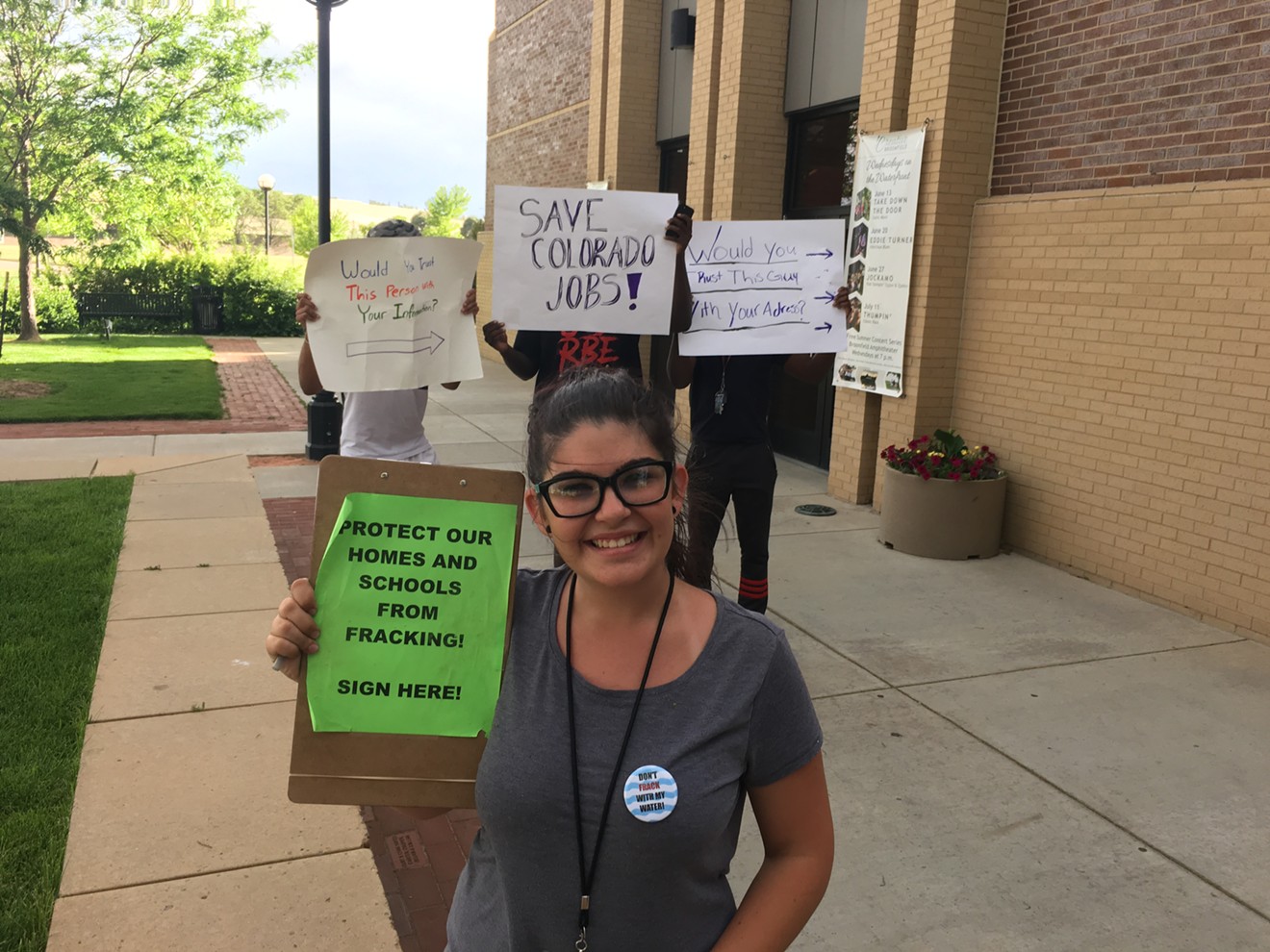Some of the industry's most important players and associated groups have resorted to using "dirty tricks" to keep voters from approving Proposition 112, its supporters say. The proposition would require 2,500-foot setbacks from schools, homes, water sources and other "vulnerable" areas for all new oil and gas wells.
The tricks began even before Proposition 112 made the ballot. Colorado Rising, which funded the initiative, says that as its volunteers were gathering signatures to make the November ballot, they were harassed by "protesters," who, as it turns out, were being funded by some of the biggest names in the state's oil and gas industry. A company Colorado Rising paid to gather signatures made off with a few boxes before returning them, with one company even admitting it was paid by a pro-industry group to quit the campaign.
The tricks continue. Colorado Rising says opposition groups like Protect Colorado and Colorado Rising Action are using confusing messaging to hide who's really funding the opposition. And Colorado Rising spokeswoman Anne Lee Foster says a Democratic state legislator, whom she would not name, asked Colorado Rising to drop the initiative from the ballot if backers of Amendment 74 — a constitutional amendment funded by the oil and gas industry that would require the state to compensate landowners who see a decrease in property value due to government regulation — also dropped theirs. Foster says Colorado Rising has refused.
Keith Barnish, a spokesman for the Senate Democrats, says he's not aware of any such deal. A spokesman for the Colorado Farm Bureau, which is backing Amendment 74, didn't respond to questions about it.
"We aren't willing to bargain with the health and safety of hundreds of thousands of Coloradans, and we've been working on this issue for seven years," Foster explains. "Nothing has budged at the state level or otherwise, so we feel this is a last-ditch effort to actually protect our communities from toxic industrial fracking activity." Proposition 112 supporters, especially, aren't wiling to back down when Amendment 74 might not even have a shot at passing, Foster says.
There's also the striking similarity in the names of groups opposing Proposition 112 and the groups who support it and other anti-fracking legislation. When a grassroots group called Protect Our Colorado formed, opponents on the oil and natural gas side quickly formed Protect Colorado, the organization funding Amendment 74 and rolling commercials against Proposition 112. And there is a grassroots, anti-fracking group called CREED — short for Coloradans Resisting Extreme Energy Development — and a counter-group of opponents called CRED, Coloradans for Responsible Energy Development, says Russell Mendell, a volunteer for Colorado Rising.
When Colorado Rising showed up, opponents formed Colorado Rising Action, which is opposing Proposition 112. It's not a coincidence, Mendell says. The similarity of the names has the potential to confuse voters and mislead what the oil-and-gas-backed organizations are actually supporting. A spokeswoman for Colorado Rising Action says the group is simply a state arm of conservative issues group America Rising Squared.

Fracking operations, mostly hidden behind a sound wall, are as close as 500 feet from some homes. Proposition 112 would require them to be at least 2,500 feet away from homes, schools, water sources and other "vulnerable" areas.
Anthony Camera
“People always ask me one question all the time: ‘How do I know that I won’t be found out as a supporter of what you’re doing?’” Berman says to the crowd in the recording. “We run all of this stuff through nonprofit organizations that are insulated from having to disclose donors. There is total anonymity. People don’t know who supports us.”
Some oil and gas executives distanced themselves from Berman after the speech, according to the Times, but the strategy resembles those used in Colorado against Proposition 112, Mendell says, with ambiguous nonprofits and political committees running ads and funding ballot initiatives without disclosing their ties to the oil and gas industry.
"They have to pull out these dirty tricks in order to have a shot," Mendell says of the opposition. "They're spending tens of millions of dollars trying to confusing voters by using our names, using confusing messaging. They think that's the best tactic to win."
Proposition 112 also has its fair share of opposition outside of the industry. Neither of Colorado's gubernatorial candidates, Democrat Jared Polis and Republican Walker Stapleton, support the measure. Nor do the Denver Metro Chamber of Commerce, Club 20, the Colorado Association of Commerce and Industry, the Colorado Municipal League and the Colorado chapter of the National Federation of Independent Business. Opponents claim the measure goes too far and will hurt the economy. Protect Colorado claims on its website that the measure would eliminate "hundreds of thousands of jobs."
Tony Gagliardi, state director of the National Federation of Independent Business, claims in a press release that Proposition 112 could "literally trigger a recession in Colorado."
Colorado Rising, on the other hand, says polling shows 69 percent of voters support the measure. If it passes along with Amendment 74, then things could get really interesting.












